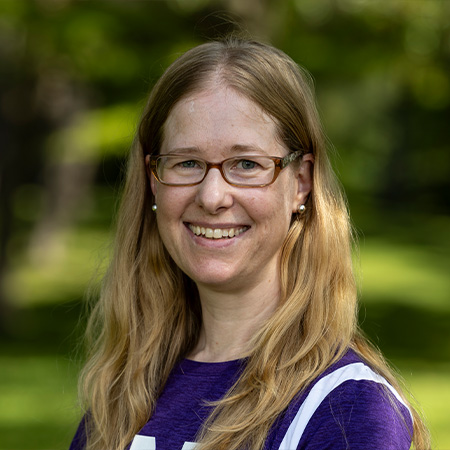Biography
Christa Haverly is a Research Assistant Professor in the Learning Sciences Department of the School of Education and Social Policy at Northwestern University. After obtaining her Ph.D. at Michigan State University in Curriculum, Instruction, and Teacher Education, she started at Northwestern University as a postdoctoral fellow. Her professional background before pursuing academia was as an elementary school teacher, with a bachelor’s degree in Elementary Education from Boston College. Dr. Haverly’s research interests are situated in the field of elementary science education. She is interested in elementary teachers’ responsiveness to students’ sensemaking in science classrooms from both a disciplinary and an equity lens. She is also interested in how schools and school districts organize in support of instructional improvements in elementary science. At home, she has a daughter in preschool and a dog and enjoys traveling with her family and tending her small balcony garden.
Education
- Ph.D., Michigan State University, 2019
- M.S., Nova Southeastern University, 2008
- B.A., Boston College, 2002
Awards and Honors
-
MSU Dissertation Completion Fellowship, 2019
-
CADRE Fellow, 2018-2019
-
MSU Graduate School Writing Fellow, 2018-2019
-
ESERA Summer School Scholar, 2018
-
Sandra K. Abell Scholar, 2017
Selected Publications
Haverly, C., Barton, A.C., Schwarz, C.V., Braaten, M. (2020). “Making space”: How novice teachers create opportunities for equitable sense-making in elementary science. Journal of Teacher Education 71(1), 63-79.
https://doi.org/10.1177/0022487118800706Haverly C., Davis, E.A. (2023). Unpacking readiness for elementary science teaching: What preservice teachers bring and how that can be shaped through teacher education. Studies in Science Education.
Haverly, C., Hossein, H., Richards, J. (2021). Mapping vocabulary onto student sense-making. Science and Children 59(2), 22-26.
Haverly, C., Lyle, A.M., Spillane, J.P., Davis, E.A., Peurach, D.J. (2022). Leading instructional improvement in elementary science: State science coordinators’ sense-making about the Next Generation Science Standards. Journal of Research in Science Teaching 59(9), 1575-1606.
https://doi.org/10.1002/tea.21767.
Lyle, A.M., Spillane, J.P., Haverly, C. (2023). State-level efforts to reform elementary science education. Educational Policy.
Marshall, S., Haverly, C., Ibourk, A. (2021). Towards equitable science instruction: The current state of elementary science education in the United States and policy considerations. In M. Atwater (Ed.), International Handbook of Research on Multicultural Science Education: Springer.
https://10.1007/978-3-030-83122-6_22Schwarz, C.V., Braaten, M., Haverly, C., de los Santos, E.X. (2021). Using sense-making moments to understand how elementary teachers’ interactions expand, maintain, or shut down sense-making in science. Cognition and Instruction 39(2), 113-148.
https://doi.org/10.1080/07370008.2020.1763349